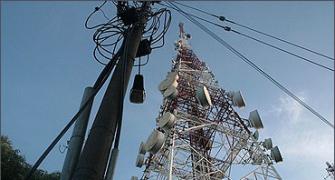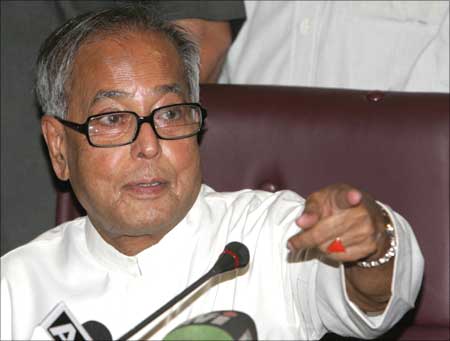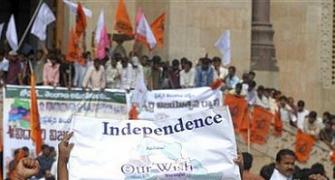The text of Telecom and Communications Minister Kapil Sibal's statement defending Home Minister P Chidambaram on his alleged involvement in the 2G spectrum scam, on behalf of the United Progressive Alliance government
"Since the submission by the CAG of the Performance Audit Report on "Issue of Licences and Allocation of 2G spectrum", there have been intense debate and criticism on the issue. The debate has taken a perverse turn and the NDA, besides some individuals, is making an attempt to malign and defame Shri P Chidambaram, Home Minister.
"We, in Government, categorically reject all such allegations. Shri P Chidambaram is a valued colleague and has discharged his responsibilities without fear or favour and with absolute integrity and devotion.
"Government is concerned that the public arena is being converted into a forum for a public trial of allegations and counter-allegations, many of which have no relation to facts. Government is, therefore, of the view that the matter must be put in perspective and the incontrovertible facts brought on record.
"The Telecom Sector was opened for private participation in 1994. Two licences were granted in each of the four major cities; the third licence was granted to MTNL/BSNL; and the fourth cellular operator was granted a licence in 2001 based on auction with 'entry fee' as the single bidding parameter. The entry fee was about Rs.1650 crore.
"Based on a Cabinet decision dated October 31, 2003, guidelines for the Unified Access Service Licences (UASL) were issued on November 11, 2003. On 'entry fee', the Cabinet decision of October 31, 2003 was that:
"The recommendation of TRAI with regard to implementation of Unified Access Licensing Regime for basic and cellular services may be accepted. DoT may be authorized to finalise the details of implementation with the approval of Minister of Communications & IT in this regard including the calculation of entry fee depending upon the date of payment based on the principles given by TRAI in its recommendations." (para 2.4.6 of the note for Cabinet)
On 'spectrum pricing, the decision was that "
the Department of Telecom and Ministry of Finance would also finalize spectrum pricing formula, which will include incentive for efficient use of spectrum as well as disincentive for sub-optimal usages
". (para 2.1.3 of the note for Cabinet)
"All UAS licences given subsequently under the new regime were given after charging the same entry fee of about Rs.1650 crore on a first-come-first-served basis. There was no fresh auction. The licence had provisions for allocation of a certain amount of spectrum subject to availability.
"In 2007, the Ministry of Finance, in the context of issuance of permission for usage of dual technology spectrum, raised the issue of one-time fee and stated that the rate of Rs. 1600 crore, determined as far back in 2001, had been applied for a licence given in 2007 without any indexation, let alone current valuation. In response, DoT maintained that dual technology licences were issued based on TRAI's recommendations which had not recommended any changes in the entry fee. The discussions between Ministry of Finance (MoF) and Department of Telecommunications (DoT) took place at the official level and through exchange of correspondence. DoT maintained that the initial entry fee should remain unchanged.
"On August 28, 2007, TRAI recommended that there should be no change in the policy in allotting 2G
"During the period up to the issue of Letters of Intent on January 10, 2008, Shri A Raja, then Minister of Communications, did not hold any meeting with Shri P Chidambaram, then Finance Minister. DoT turned down the suggestion of revision of entry fee and maintained that, based on TRAI's recommendations, DoT would continue with the same policy that had been followed since 2003. Shri A Raja also assured the Prime Minister that the policy would be implemented in a fair and transparent manner.
"Letters of Intent were issued to new entrants on January 10, 2008. It is the validity of these LoIs that is now in issue.
"It will be clear from the foregoing sequence of events that Shri P Chidambaram was in no way responsible for the issue of LoIs on January 10, 2008 or the charging of entry fee of about Rs.1650 crore. In fact, the record will show that the Ministry of Finance had no knowledge that the LoIs would be issued on January 10, 2008.
"The LoIs issued on January 10, 2008 were issued on the basis of the same policy that had been followed since 2003. Government owns the policy. In fact, the Prime Minister is on record stating: "My own view has been that as far as the telecom policy that was sought to be implemented by the UPA government is concerned, in the basic policy, there was nothing wrong. It was consistent with the advice given by the TRAI; it was consistent with the need that we all felt to maximise teledensity."
"Even while owning the policy, Government is aware that there may have been irregularities or misconduct in the implementation of the policy. Shri A Raja had categorically assured the Prime Minister that the policy would be implemented in a fair and transparent manner. Several irregularities and deviations have since been pointed out in the implementation of the policy. All these are matters that are being investigated and will be decided in accordance with law in the appropriate courts. Government wishes to emphasise that these are not matters which can be decided in a public debate. We should let the courts decide these matters.
"As Finance Minister, it was Shri P Chidambaram who raised the issue of revision of entry fee. However, the final view taken by DoT was that it would adopt the same policy that had been followed since 2003, including charging the same entry fee of about Rs.1650 crore. It is therefore preposterous to suggest that Shri P Chidambaram had any role to play in "fixing" the entry fee for the LoIs issued on January 10, 2008. It is pertinent to point out that CBI has submitted to the Supreme Court that it had looked into the matter thoroughly, recorded the statement of the then Finance Secretary, and had come to the conclusion that no official of the Ministry of Finance, including the then Finance Minister, had committed any irregularity or misconduct. Therefore, any attempt by the opposition to foist any culpability on Shri P Chidambaram is not only irresponsible but is yet another desperate attempt to make the institution of Parliamentary democracy dysfunctional.
"The opposition in Parliament has an important role to play and the Government is willing to cooperate with the opposition to ensure that all issues of importance are discussed in accordance with the rules. The opposition must also cooperate with the Government in ensuring that government business is transacted and crucial legislations are passed."

'Chidambaram a valued colleague, NDA trying to malign him'








